Costa Rica is the second most violent country for Nicaraguan women, according to Católicas por el Derecho a Decidir. They say migration makes women more vulnerable to violence, exposing them to situations where their lives are at risk
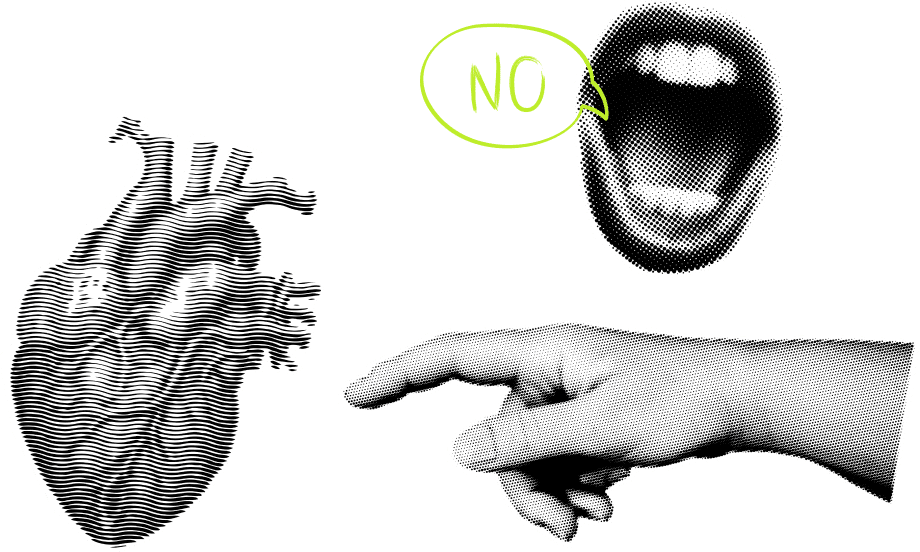
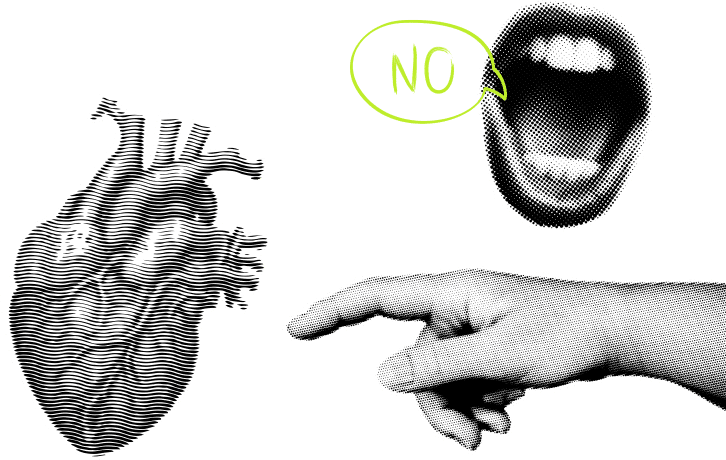


Madeleyni Hernández stands in front of the mirror in her room, gazes into her eyes for a few minutes, and asks herself: “Madeleyni, where is this glow coming from? Where had this glow been lost?” The answer is clear: that glow had disappeared due to violence.
After six months of having denounced her ex-partner for physical and psychological abuse, 21-year-old Madeleyni still finds herself piecing together parts of herself that were severed in her relationship, such as trust and self-confidence.
Although it hasn’t been long since she decided to separate and break the silence for the first time, she speaks of her story with resilience and determination. “I still think about everything I survived and how I lost myself. Now I feel good about myself,” she says.
As she speaks, she holds two key objects for her story in her hands: a sign with the signs of domestic violence that helped her identify what she was experiencing and violet glasses representing feminism, which she claims saved her.
Madeleyni is originally from Jinotepe, Carazo, and had to exile to Costa Rica with her family in July 2018 because her parents faced political persecution for participating in protests against the Ortega-Murillo dictatorship in the same year.
When she arrived in Costa Rica, she completed her high school education in a Christian boarding school and, upon finishing her studies, reunited with someone she already knew from Nicaragua. “I graduated from the boarding school. Later, I met someone, I already knew him from childhood because he is from the same place I am. That’s when everything changed,” she recounts.
“That someone” she reunited with eventually became her boyfriend. Six months into the relationship, she moved into his house. Like all aggressors, he hid his violent behaviors at first. “At the beginning, everything was fine. He treated me well and was very attentive,” she says. While he went to work, she stayed home since she didn’t have a full time job.
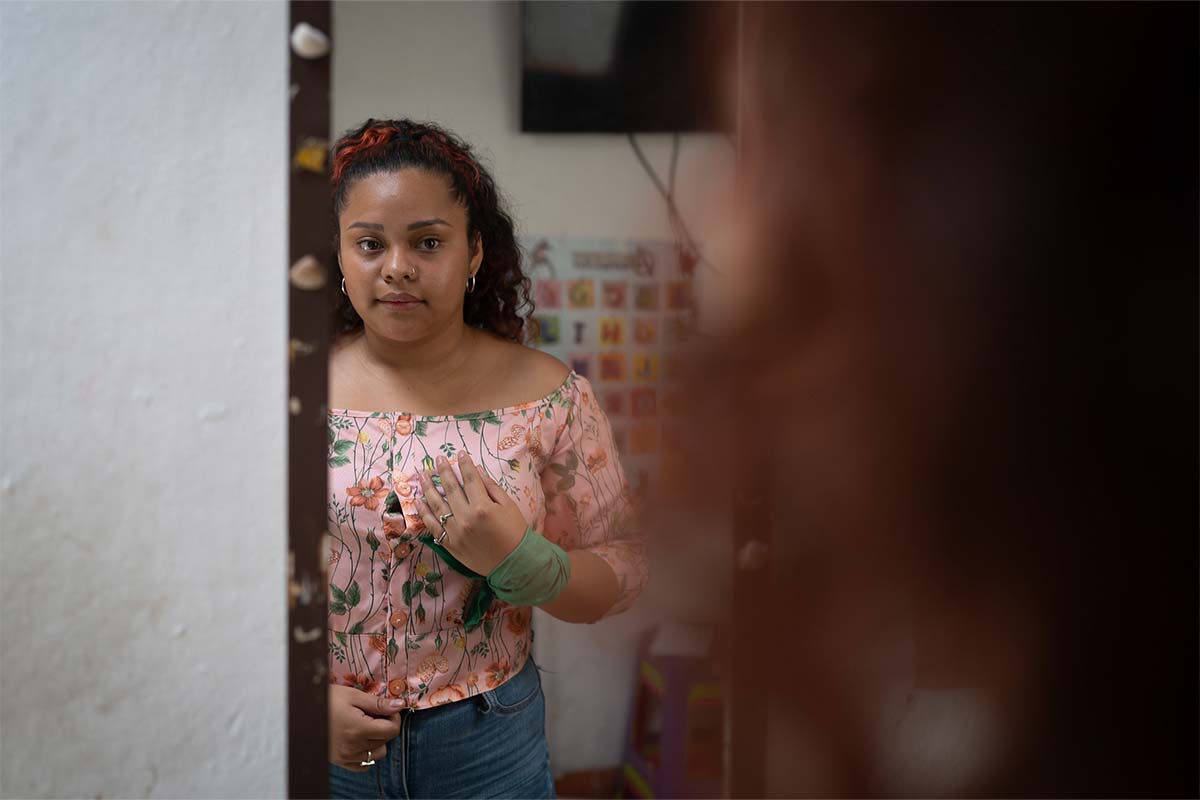
It didn’t take long for him to assault her for the first time. He slapped her for deleting a photo from his phone, and since it was an unexpected situation for Madeleyni, she didn’t know how to react. “As time passed, he changed everything. He slapped me. Obviously, I was scared, but I didn’t do anything. After that, he apologized,” she says.
The situation worsened when her partner’s brother came to the house, and their mother left her job to be at home full time. Madeleyni not only had to deal with her boyfriend’s aggression but also with those of her brother-in-law and mother-in-law.
After an argument in which her brother-in-law almost hit her, she and her boyfriend decided to move out with the hope that everything would improve. On the contrary, the aggressions reached the point where he threatened her with a knife. “I didn’t know what to do at that moment. I just told him: if you have the courage to do it, do it,” she recounts.
Machismo violence knows no borders for Nicaraguan women, says the feminist organization Católicas por el Derecho a Decidir (CDC) to DIVERGENTES.
According to CDC, Nicaraguan women are more vulnerable to violence in foreign countries because they often lack networks to protect them. They are economically dependent on their male partners and are unaware of their rights in the countries they migrate to, so they don’t know how to seek help when faced with life-threatening situations.
“Violence does not stop for women, whether it’s physical, economic, or sexual. Women have to leave their country to give their children a better life; they leave due to political persecution or because they dream of finding a better life, but their aggressors take that away, and in some cases, even their lives,” the organization states in response to DIVERGENTES’ inquiry.
The factors that make women vulnerable to violence in their own countries are heightened when they migrate. For example, the cost of living in destination countries and the lack of access to well-paid jobs force women to live with their partners to share expenses, complicating the possibility of break up.
In other cases, women’s economic dependence is total and more common when their partners do not allow them to work. This also happened to Madeleyni when she moved in with her boyfriend. The control he had over her life led to him forbidding her to work. “He didn’t let me work. He always said, ‘Why work when I give you everything?’ but it was because he didn’t want me to interact with anyone. I couldn’t do anything,” Madeleyni recounts.
According to CDC, Costa Rica is the second most violent country for Nicaraguan women and the second-highest in femicide rates of Nicaraguan women.
Of the 73 femicides of Nicaraguans recorded in 2023 by the CDC Violence Observatory, 22 occurred abroad. Only in Costa Rica were there reported 12 femicides of Nicaraguans. In the United States, there were five, in Guatemala two, and one in each of Honduras, Spain, and Mexico.
The organization points out that the recorded data doubles the number of femicides that occurred abroad in previous years. “In 2023, there were 11 more cases of femicides against Nicaraguans abroad. We see how violence against women intensifies, both inside and outside the country,” the organization says.
Impunity comes with these femicides, as only 5% of them gained access to international justice in 2023, according to CDC records. In other words, only in two cases were femicides prosecuted: Jared Dicus, an American who murdered his Nicaraguan wife in the United States, and an Ecuadorian whose name was not revealed by authorities, who murdered a Nicaraguan in Spain. The rest of the cases, including those in Costa Rica, remain unpunished.
CDC exposes that this situation is “concerning.” The murders of Nicaraguan women account for 15% of violent deaths of women in Costa Rica in 2023, according to the Gender Observatory of the Costa Rican Supreme Court.
“Costa Rican authorities always say that the murders of Nicaraguan women were carried out by hitmen. They tell you there is a hitman gang, and that they are unknown. That’s how most femicides in Costa Rica have been left,” feminists from the organization express.
“But not all murders of Nicaraguan women in Costa Rica are due to hitmen. We saw that last year, a man killed a woman in Nicaragua and then killed another in Costa Rica. That man is still free; neither Nicaraguan nor Costa Rican authorities have arrested him,” they continue.
The case CDC refers to is that of Gabriel Antonio Guadamuz Orozco, alias “Colombiano,” the main suspect in the murder of Brenda del Carmen Hernández Escoto in León in 2022 and of Nicaraguan Aura Lilly Velasquez Rocha in Nicoya, Costa Rica, in May 2023. Despite being accused of both femicides, this man remains free.
Access to justice is complicated for the families of victims since one of the requirements for state institutions to make efforts to capture femicides and aggressors is that a family member carries out proceedings in the country where the crime was committed.
“As we have said, many women leave the country alone and without networks, so many do not have family members in the countries where they migrated to demand justice for them or at least help them when they are alive,” they express.
CDC states that femicides are an index that also shows the increase in other types of violence against Nicaraguan women. It’s not just homicidal violence, they say, but also how women increasingly face physical, psychological, sexual, and economic aggressions.
Factors such as the migration crisis are one of the reasons for this increase, combined with the rise in violence in Costa Rica and the lack of specialized state policies in preventing violence against women, both from Nicaragua and Costa Rica.
2023 was one of the most violent years for all women residing in Costa Rica. The Gender Observatory recorded 72 violent deaths of women, of which 18 were classified as femicides according to the Law Penalizing Violence against Women, 17 were classified as homicides, and 37 remain unclassified.
“The government does not protect women, neither inside nor outside the country. We are completely unprotected, and patriarchal culture continues to owe women. Women continue to be victims of this system, where our lives are worth less than $500,” says one of the CDC members.
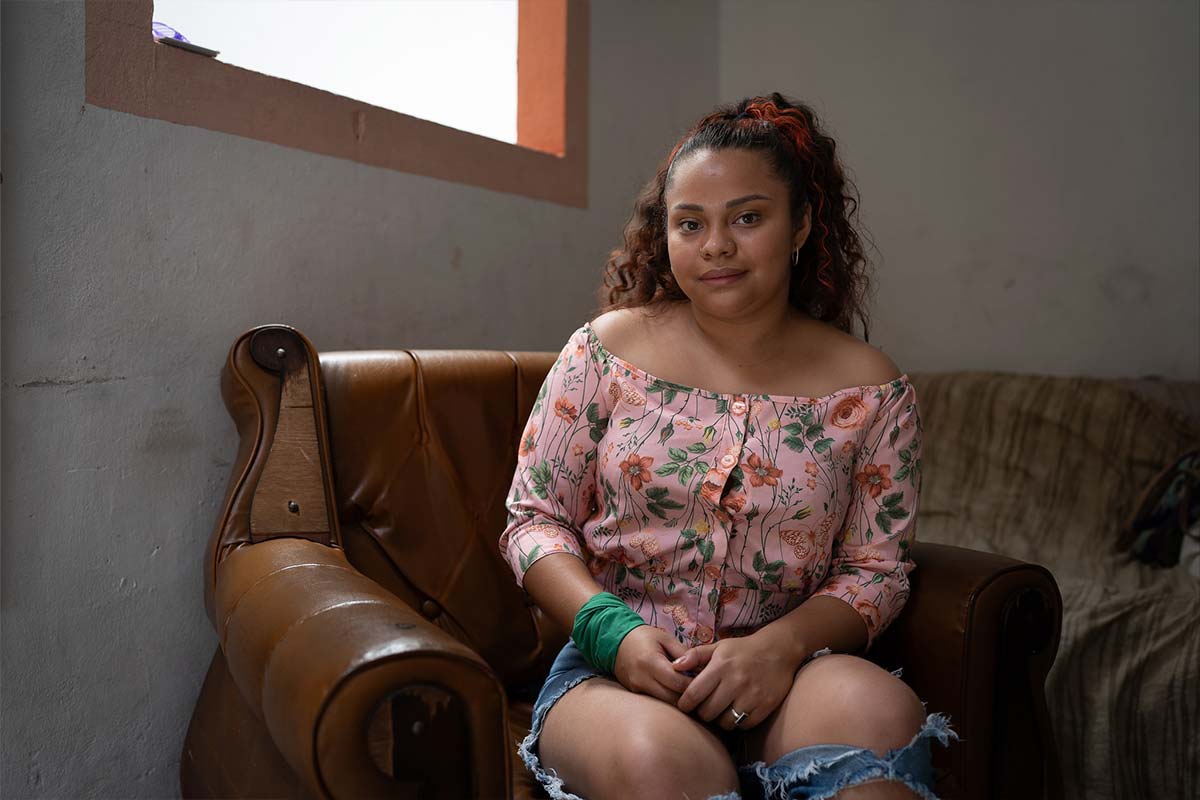
“I experienced very difficult situations with him,” Madeleyni continues her story. The young woman had become pregnant by her partner, but instead of taking responsibility, he continued to abuse her and forbade her from going to obstetric check-ups.
When she finally managed to go for a check-up, she was informed that she had lost the pregnancy and needed to undergo dilation and curettage. “It was horrible, one of the most horrible things that have happened to me in life. I can’t describe it, and I was alone,” she recounts.
“At the hospital, they had told me that I couldn’t have sex for at least 30 days. However, he didn’t respect that. He forced me to have sex, and it was horrible,” she adds.
The violence she experienced was also filled with insults, negative comments about her body, prohibitions to talk to her family, and absolute control over everything she did.
Unexpectedly, her boyfriend had a serious accident that left him temporarily immobilized, and Madeleyni saw it as an opportunity to return home to her family. “I told him we should go live at my house, that it would be easier there. I was looking for a way to be in my house because I thought he wouldn’t harm me here,” she comments. “But he didn’t calm down; the beatings continued, but quietly,” she continues.
During this time, some friends invited her to feminist spaces where discussions about lives free of violence, self-care, and empowerment took place. In one of the workshops, she was given a booklet showing signs of violence and the degrees of danger of each. “I have been through all of this,” she told herself.
Madeleyni began to question the violence she was experiencing and whether it was fair for her partner to treat her that way. According to the young woman, she believed everything he told her, including that she deserved all those beatings and insults. “If he told me I was ugly, I believed it. If he said a shirt looked bad on me, I changed the shirt because I believed him,” she says.
The aggressions reached their peak when Madeleyni discovered that her boyfriend was cheating on her, and she confronted him. Although her boyfriend had previously attempted to take her life, that was the first time Madeleyni thought he would really kill her.
“I confronted him about the photo with that girl; he got up and was going to hit me with the fan, but he couldn’t. We started fighting; I threw things at him, and he grabbed an aluminum bottle and hit me. I covered my head because I thought: if he manages to hit my head, he will kill me,” she narrates.
“He threw me on the bed and started choking me. That moment was horrible. I only thought of my mom because I felt awful and saw everything blurry. I just cried and thought of my mom. I said, ‘she will find me dead.’ It’s the only thing I thought about,” she confesses.
After a long struggle, Madeleyni managed to free herself from her boyfriend, and one of her aunts arrived at the house, so with her help, they kicked him out of the house. Until then, she hadn’t told anyone what she had been going through for a year and a half, but she decided it was time to break up and report him.
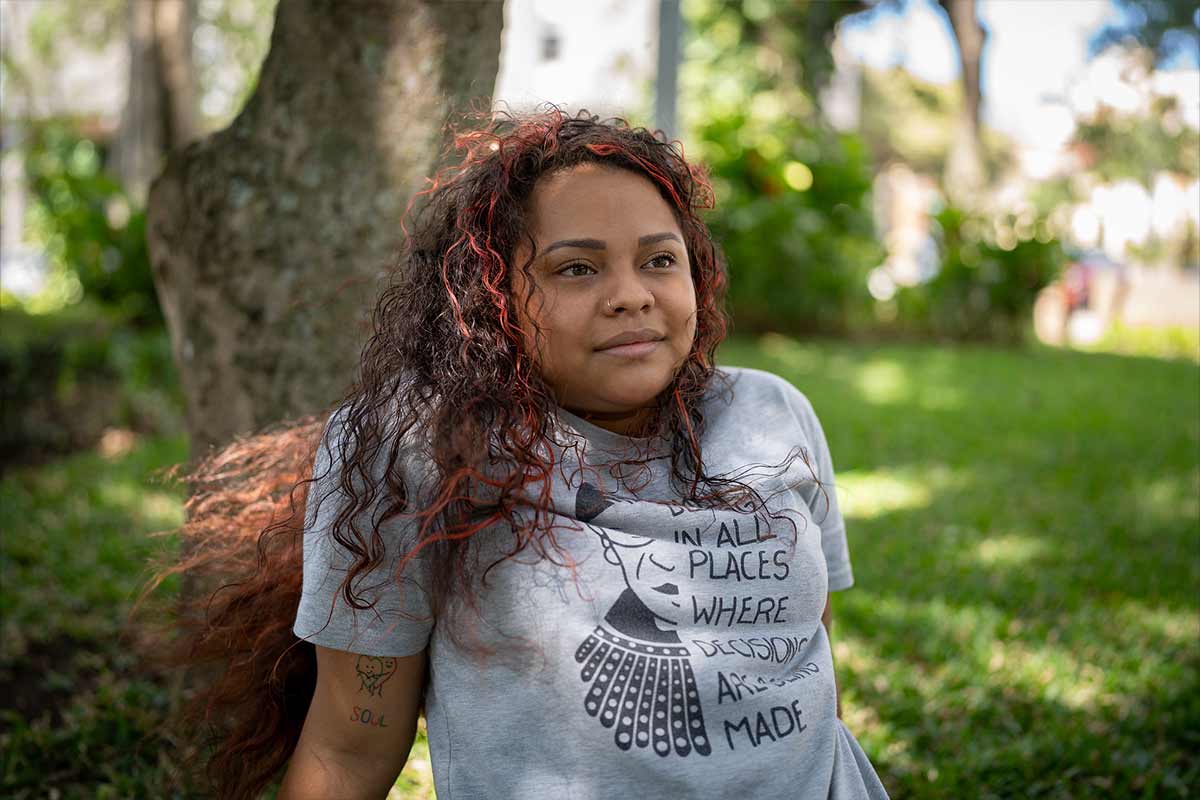
Madeleyni once again stands in front of the mirror, this time to tell her story to others. She puts on the feminist scarf and sees herself for a while. She says that if it hadn’t been for those women’s spaces, she would probably still be in that violent relationship, or worse, dead.
After that day, in August 2023, she dared to go to the Domestic Violence Courts of Costa Rica to demand a restraining order against her ex-partner. The people who attended her referred her to Legal Medicine to assess and treat her wounds. They assigned her a lawyer to advise her, and for a moment, she thought everything was going well.
However, a few days later, officials from the Judicial Power delivered a restraining order against her: her ex-boyfriend had also reported her, and the Domestic Violence Courts scheduled a hearing.
“I was scared because I didn’t know what a hearing was. And when they came to serve me, they didn’t leave it at my house but where I was studying. I cried because I was embarrassed; I didn’t want anyone to realize what I was thinking,” she expresses.
“The director called me and asked what was going on. I told her everything, and I felt that she, being a nun, took off her habit for me. She said: for this, you shouldn’t be ashamed because you are neither the first nor, unfortunately, the last woman who will experience violence,” she adds.
On the day of the hearing, Madeleyni found all the friends she had made in the feminist movement outside the Courts, waiting for her along with her mother, aunt, and lawyer. They joined her, supported her, and cried together.
At the end of the hearing, it was determined that her ex-partner could not approach within a kilometer of her. The judge told Madeleyni that if she wanted to appeal his complaint, they would have to hold another hearing and another process, so she didn’t accept. Instead, it was established that she could not approach within 100 meters of him.
Seven months later, Madeleyni thinks about everything she went through and is surprised to still be alive. Today, she continues to receive therapeutic assistance at the National Women’s Institute (INAMU), and continues to heal external and internal wounds. “Today I am here for myself and to heal everything I have lived through,” she says.


